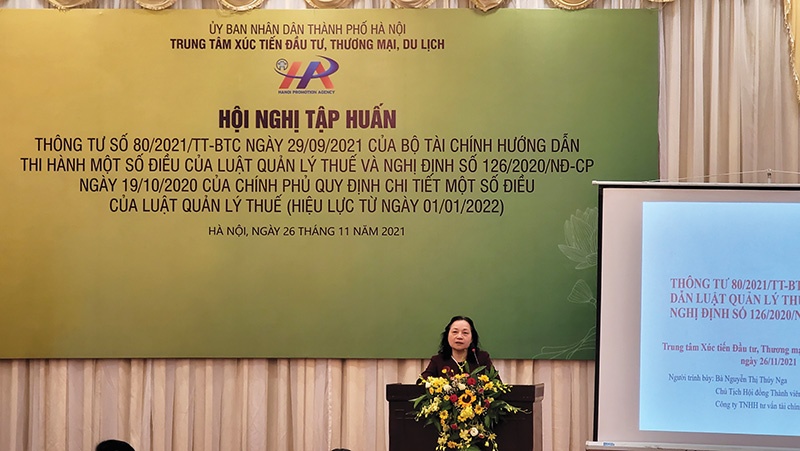Participants get to grips with tax changes for 2022
 |
| Major changes are afoot next year in tax administration |
The centre, formerly known as the Hanoi Promotion Agency, hosted a training conference regarding Circular No.80/2021/TT-BTC, which governs the execution of certain provisions of the Law on Tax Administration No.38/2019/ QH14 and Decree No.126/2020/ND-CP detailing this law. The circular shall take effect from January 1, with the tax declaration form prescribed in it applicable to tax periods starting from the same date.
The conference in late November emphasised some major changes in respect of the tax payment allocation mechanism and principles of tax declaration and tax administration introduced under Circular 80 and Decree 126. It gathered 100 participants, including leaders from several governmental ministries in Hanoi, high-profile speakers, investors, and regional enterprises.
According to Circular 80, where taxpayers with centralised accounting have operations and business activities in provinces other than the head office, the tax declaration and submission will be centralised at the head office’s province, while tax liability payment will be allocated to each province where the business is carried out.
Nguyen Thi Thuy Nga, chairwoman of the Members’ Council at FAC Financial & Accounting Consultant Co., Ltd., said that compared to the previous legal corridor, Circular 80 requires more supporting documents in the tax refund dossier as well as supplemental guidance for handling some specific events arising after tax refunds.
Nga also outlined at the event how Vietnamese businesses may improve their capacity in accordance with the new tax administration for e-commerce, digital-based companies, and other services offered by overseas suppliers who do not have a permanent presence in Vietnam.
Moreover, the fresh circular also supplements the provision that the tax authority will have to issue a notice on whether the taxpayer is or is not eligible for tax exemption or reduction under a double tax agreement or other international treaties. The deadline for issuing a notice is 30 days or 40 days (in case there is the need of carrying out a tax audit) from the date of receipt of complete dossiers.
According to consultancy Acclime, under Circular 80, overseas suppliers can authorise organisations or tax agents in Vietnam to conduct tax registrations, declarations, and payments on their behalf. If the overseas supplier authorises an organisation or tax agent to operate under Vietnamese law, or authorised party, the authorised party is responsible for carrying out the procedures of tax registration, declaration, and payment according to the contract signed with the overseas supplier.
“Registered non-resident suppliers will pay the tax on a quarterly basis, while banks and intermediary payment service providers will deduct and remit tax on a monthly basis,” Acclime noted. “If the overseas supplier pays more than the payable tax amount according to the declaration, the overseas supplier may offset the payable tax amount in the next tax period.”
In the case of overseas suppliers not registering, declaring, or paying taxes here, Vietnamese organisations that purchase goods or services from overseas or distribute goods or provide services on behalf of those suppliers will be responsible for declaring, withholding, and paying VAT and corporate income tax, following Circular No.103/2014/TT-BTC guiding tax obligations of foreign groups or individuals doing business or earning income in Vietnam.
| VAT under Circular 80 - Remove the regulation on VAT declaration for out-of-province sales to local tax authorities. - For real estate transfer and construction activities: the allocated VAT is 1 per cent of the revenue generated in that province, reduced from 2 per cent; - For dependent units, the business locations which are production facilities, the allocation method remains unchanged. Their allocation rate is still 1 per cent applied for products subject to a VAT rate of 5 and 2 per cent for products subject to 10 per cent tax. If the production facility transfers finished or semi-finished products to other internal units for sale, the turnover of the manufactured products shall be determined on the basis of the production costs of the products. - If the tax amount to be distributed in the provinces is larger than the total tax payable at the head office, the allocation shall be made according to the ratio of revenue of products produced in each province to total revenues (exclusive of VAT) of the taxpayer’s manufactured products. Corporate income tax under Circular 80: - Allocating according to the ratio of actual incurred expenses in the period. In case production facilities are subject to corporate income tax incentives, they shall declare tax separately as per the instructions under Decree 126; - For real estate transfer, the allocated tax is equal to revenue multiplied by 1 per cent. There is no longer a case of calculation using revenue minus expenses as previously prescribed. - If the tax amount temporarily paid quarterly is larger than the tax payable according to the tax finalisation, it shall be determined as the overpaid tax amount and handled as per regulations. |
What the stars mean:
★ Poor ★ ★ Promising ★★★ Good ★★★★ Very good ★★★★★ Exceptional
Related Contents
Latest News
More News
- Cashless payments hit 28 times GDP in 2025 (February 04, 2026 | 18:09)
- SSIAM and DBJ launch Japan Vietnam Capital Fund (February 04, 2026 | 15:57)
- Banks target stronger profits, credit growth in 2026 (February 04, 2026 | 15:43)
- Vietnam on path to investment-grade rating (February 03, 2026 | 13:07)
- Consumer finance sector posts sharp profit growth (February 03, 2026 | 13:05)
- Insurance market building the next chapter of protection (February 02, 2026 | 11:16)
- NAB Innovation Centre underscores Vietnam’s appeal for tech investment (January 30, 2026 | 11:16)
- Vietnam strengthens public debt management with World Bank and IMF (January 30, 2026 | 11:00)
- Corporate bond market poised for stronger growth cycle (January 28, 2026 | 17:13)
- Vietnam's IPO market on recovery trajectory (January 28, 2026 | 17:04)

 Tag:
Tag:



















 Mobile Version
Mobile Version